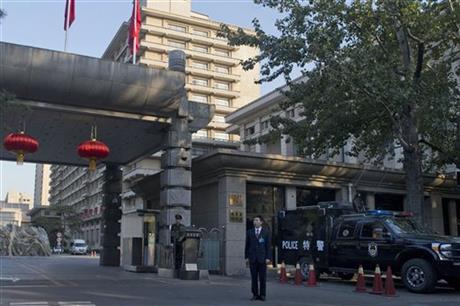
By JOE McDONALD
Chinese security personnel guard the entrance to the Jingxi hotel where the Communist Party’s 205-member Central Committee gathered over the weekend for its third annual plenum in Beijing Tuesday, Nov. 12, 2013. In a brief statement issued after the four-day Communist Party conference aimed at producing a reform blueprint for the next decade China’s leaders have promised to give the free market an even bigger role as they overhaul the worn-out growth model of their slowing, government-dominated economy. (AP Photo/Ng Han Guan)
BEIJING (AP) — Communist Party leaders issued a report Tuesday that pledged to promote market forces in the country’s state-dominated economy. But their four-day policymaking meeting, which was shrouded in secrecy, failed to produce dramatic reforms to overhaul a worn-out growth model. That suggested party leaders failed to agree on politically difficult changes required to curb the dominance of state industry and promote competition.
WHAT WERE THE MAJOR CHANGES THE COMMUNIST PARTY ANNOUNCED?
Communist leaders promised to promote market forces. That could help Chinese entrepreneurs who can be more efficient and flexible than state companies. It is in line with piecemeal party efforts to inject elements of competition into areas such as banking. But the party also affirmed the role of government-owned companies as the core of the economy. Major changes are probably yet to be decided.
WHY IS THE COMMUNIST PARTY ANNOUNCING THESE CHANGES NOW?
Communist leaders need to refresh a growth model based on trade and investment that delivered three decades of stunning growth but has run down. Reform advocates including the World Bank say Beijing needs to curb the dominance of state companies in areas from banking to energy to telecoms to keep growth strong. Pressure for change has mounted as economic growth slowed over the past two years, hitting a two-decade low of 7.5 percent in the three months ended in June.
HOW LONG WILL IT TAKE FOR THESE CHANGES TO BE IMPLEMENTED?
The ruling party gave no time frame for change and said it will create a committee to “deepen reform.” That indicates many key issues remain to be decided in potentially contentious political battles.
WILL THEY FACE ANY RESISTANCE?
Any changes that might curb the privileges of politically favored state industries or force greater competition on them will likely face opposition from those companies and their allies in the ruling party. The lack of dramatic changes coming out of the weekend meeting is a sign that party leaders who are pushing for changes already face resistance from within their own ranks.
WHO WILL WIN?
Potential winners from any changes that open markets to more competition would be entrepreneurs and possibly foreign companies, which now face an uphill battle against government companies. China’s public also might benefit from lower prices and a greater variety of products and services, as well as possibly better job opportunities.
AND WHO WILL LOSE?
The likely losers from increased competition would be state companies that might lose monopolies, low-cost access to bank loans and other favors.
HOW WILL FOREIGN COMPANIES BE AFFECTED?
The plan makes no mention of foreign companies. More competition might give foreign companies more opportunities but Chinese regulators also are determined to capture as much of the benefits of economic growth as they can for local companies, whether private or state-owned. They might still try to put up barriers to limit the foreign role in markets that are opened to private sector competition.



